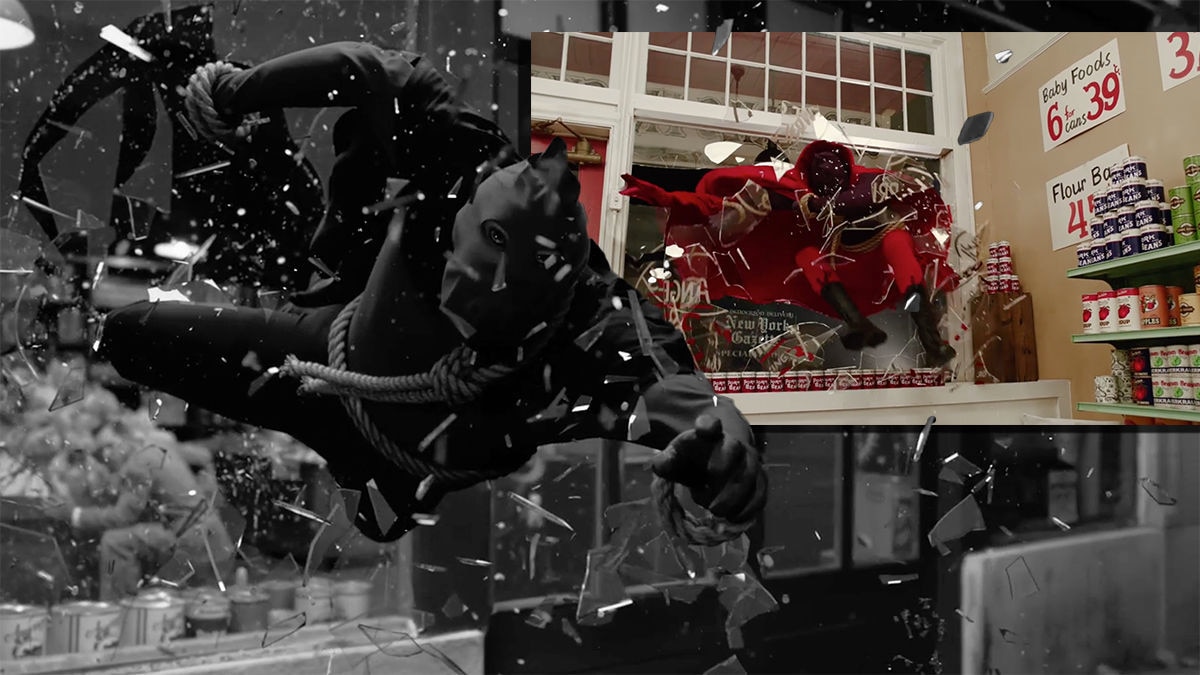
Let's take a brief break from daily life and consider all we know, have interacted with over our lifetimes, and perhaps even discussed here at Relevancy22. The HBO series Watchmen might be the perfect time to consider where we are, have been, and might be going in the Age of Pluralism, Disruption, and Imagination.
R.E. Slater
November 27, 2019
* * * * * * * * * *
Damon Lindelof has created a new series that is much
less complicated than his blockbuster TV show LOST that I enjoyed so very much but promises to be every bit as fun and perplexing. Expect some
violence as the 1986 comic series it is based off was quite violent as was the 2009 movie as they seem to be asking the question,
“Does violence beget violence or is it a necessary evil used to survive?”
Context is everything. And for a writer, an artist, or even a film producer, having context that has matured with perspective allows the subject matter to be formed (or re-formed) into a more beneficial mode of discussion for societies struggling with confusion, doubt, and fear. All infamous hallmarks, I might add, under the "golden age" of Trumpism.
Having not read any of the 12-part comic series (completed between 1986-87) but having recently watched the 2009 movie series Watchmen for helpful context, I am finding HBO’s Watchmen series a great understatement to approaching the questions American society has been struggling with. Questions such as whether black lives matter (they do!). Or, whether domestic policing can be racist (they can be!). Or, whether our allegiance to Flag and Country can be rightfully questioned against a nationalised patriotism that doesn't recognise the Constitutional rights of all elements of its society (it must be!). Even so, I suspect Damon Lindelhof of twisting the elements of this most modern and yet oldest of tales to address these politic factors of human justice and individual psyche in a way which might help any constitutionally constructed postmodern society in facing up to failures and opportunities for redressing those failures in constructive fashion.
For myself, I fell into Watchmen without any idea of what it was about, who wrote it, or what it was attempting to say. It was an act of happenstance which caught my attention as it addressed issues such as white supremacy, the struggle of human rights over technocratic democracies moving towards soulless consumerism, to corporate governance over the rightful public governance of government, and so forth. I also had read not long ago of the Tulsa, Oklahoma, murders of the 1920s when noticing that the Watchmen rightfully started with this event based on the actual history of the harm done to 900 black residents of Tulsa of whom 100 were murdered and the other 800 suffering injuries and lost of all property to racist neighbors. When I next discovered Damon Lindelof’s name attached to the series I immediately knew it would be starkly different from the older comic series or the movie by the same name. At that point I was interested and motivated to give it a deeper look as if looking in the mirror of self-reflection asking rightful questions of meaning, purpose and identity.
So here we go, Easter eggs and all. Enjoy!
Having not read any of the 12-part comic series (completed between 1986-87) but having recently watched the 2009 movie series Watchmen for helpful context, I am finding HBO’s Watchmen series a great understatement to approaching the questions American society has been struggling with. Questions such as whether black lives matter (they do!). Or, whether domestic policing can be racist (they can be!). Or, whether our allegiance to Flag and Country can be rightfully questioned against a nationalised patriotism that doesn't recognise the Constitutional rights of all elements of its society (it must be!). Even so, I suspect Damon Lindelhof of twisting the elements of this most modern and yet oldest of tales to address these politic factors of human justice and individual psyche in a way which might help any constitutionally constructed postmodern society in facing up to failures and opportunities for redressing those failures in constructive fashion.
For myself, I fell into Watchmen without any idea of what it was about, who wrote it, or what it was attempting to say. It was an act of happenstance which caught my attention as it addressed issues such as white supremacy, the struggle of human rights over technocratic democracies moving towards soulless consumerism, to corporate governance over the rightful public governance of government, and so forth. I also had read not long ago of the Tulsa, Oklahoma, murders of the 1920s when noticing that the Watchmen rightfully started with this event based on the actual history of the harm done to 900 black residents of Tulsa of whom 100 were murdered and the other 800 suffering injuries and lost of all property to racist neighbors. When I next discovered Damon Lindelof’s name attached to the series I immediately knew it would be starkly different from the older comic series or the movie by the same name. At that point I was interested and motivated to give it a deeper look as if looking in the mirror of self-reflection asking rightful questions of meaning, purpose and identity.
So here we go, Easter eggs and all. Enjoy!
R.E. Slater
November 27, 2019

INTRODUCTION - "The Backstory to the Backstory to the Beginning"
HBO Series Trailer
Before watching HBO’s Watchmen here’s what you should know about the comic...
DC COMICS 1986-87 LIMITED SERIES
Wikipedia:
The History of the Watchmen
Did Dr. Manhattan Create the DC Universe?
THE 2009 WATCHMEN FILM
Wikipedia:
2009 Watchmen Movie based upon 1986 Comic
"The backstory to
HBO’s Watchmen Series"
Note: Having recently watched this film I found it immediately
helpful to Lindelof's newer story line. Having first watched the
first six episodes of HBO's new series the movie repeated all
that I already knew but still provided a better foundation than
not having watched it at all. - res
Watchmen (2009) Official Trailer
2009 Watchmen - Ten Years Later
Watchmen Film vs Comic Series -
What’s the Difference?
2019 HBO's WATCHMEN SERIES
Wikipedia:
HBO Watchmen Promo
Gizmodo (GZ0) - https://io9.gizmodo.com/damon-lindelof-rooted-watchmens-alternate-history-in-am-1838221427
Wikipedia - Racism in America -
The larger context I believe is the struggle we all have with accepting others different from ourselves. In a word, its known as pluralism. Below is a helpful video that I loved providing the contextual framing needed in understanding how pluralism must now become a socio-evolutionary attitude and behavior in human development in order for large civilizations to peacefully live with one another. - res
08 Pluralism & Society
GZ0 - https://io9.gizmodo.com/hbos-watchmen-wants-to-dig-into-the-heart-of-american-r-1838914665
EPISODE 1 - "IT's SUMMER AND WE'RE RUNNING OUT OF ICE"
Review of Episode 1 by Digital Trends (DT1) -
DT2 RECAP - https://www.digitaltrends.com/movies/watchmen-episode-2-surprises-easter-eggs-clues-references/
COL2 - Questions We Have - https://collider.com/watchmen-episode-3-theories/
Breakdown & Easter Eggs Video 2




DT3 RECAP – https://www.digitaltrends.com/movies/watchmen-episode-3-surprises-easter-eggs-clues-references/
GZ3 - https://io9.gizmodo.com/watchmens-ideas-about-trauma-and-legacy-are-making-the-1839618122
COL3 Questions We Have - https://collider.com/watchmen-episode-4-theories/#doctor-manhattan-toy
COL3 - Where is Adrian Veidt? - https://collider.com/watchmen-where-is-adrian-veidt/


DT4 RECAP – https://www.digitaltrends.com/movies/watchmen-episode-4-surprises-easter-eggs-references-clues/
COL4 - Questions We Have - https://collider.com/watchmen-episode-4-theories/

DT5 RECAP – https://www.digitaltrends.com/movies/watchmen-episode-5-surprises-easter-eggs-references-clues/
GZ5 - https://io9.gizmodo.com/watchmen-revealed-the-big-lie-that-changed-the-world-an-1839866493
COL5 - Damon Lindelof Explains the Squid Thing - https://collider.com/watchmen-squid-explained-damon-lindelof/
COL5 - Questions We Have - https://collider.com/watchmen-episode-5-theories-looking-glass/
COL5 - Jean Smart Interview - https://collider.com/watchmen-jean-smart-interview/
Breakdown & Easter Eggs Video 5



VUL6 RECAP – https://www.vulture.com/2019/11/watchmen-recap-episode-6-season-1-this-extraordinary-being.html
DT6 RECAP – https://www.digitaltrends.com/movies/watchmen-episode-6-surprises-easter-eggs-references-clues/
GZ6 - https://io9.gizmodo.com/sure-seems-like-one-of-watchmens-kkk-villains-is-donald-1840049969
GZ6 - https://io9.gizmodo.com/watchmens-captain-metropolis-tried-to-make-things-right-1840067391
COL6 - Hooded Justice Reveal - https://collider.com/watchmen-hooded-justice-explained/

EPISODE 1 - "IT's SUMMER AND WE'RE RUNNING OUT OF ICE"
Oklahoma, “Pore Jud Is Daid”
Watchmen Promo Episode 1
Review of Episode 1 by New York Vulture (VUL1) - https://www.vulture.com/2019/10/watchmen-premiere-recap-season-1-episode-1.html
Review of Episode 1 by Digital Trends (DT1) -
https://www.digitaltrends.com/movies/watchmen-episode1-surprises-easter-eggs-clues/
Gizmodo (GZ1) - https://io9.gizmodo.com/watchmens-incredible-soundtrack-is-coming-first-to-viny-1839237242
GZ1 - https://io9.gizmodo.com/cool-costumes-hide-dark-truths-in-the-haunting-new-watc-1838100172
Collider (COL1) - Questions We Have - https://collider.com/watchmen-episode-2-theories/
Wikipedia - Greenwood Tulsa, Oklahoma, a.k.a. "Black Wall Street" -https://en.wikipedia.org/wiki/Greenwood_District,_Tulsa
Gizmodo (GZ1) - https://io9.gizmodo.com/watchmens-incredible-soundtrack-is-coming-first-to-viny-1839237242
GZ1 - https://io9.gizmodo.com/cool-costumes-hide-dark-truths-in-the-haunting-new-watc-1838100172
Collider (COL1) - Questions We Have - https://collider.com/watchmen-episode-2-theories/
Wikipedia - Greenwood Tulsa, Oklahoma, a.k.a. "Black Wall Street" -https://en.wikipedia.org/wiki/Greenwood_District,_Tulsa
Tulsa's Black Wall Street massacre
The Tulsa Race Massacre; Then and now.
Buzztox1 (BT1)
Breakdown & Easter Eggs Video 1
EPISODE 2 - "MARTIAL FEATS OF COMANCHE HORSEMANSHIP"
 |
| George Catlin, Comanche Feats of Horsemanship, 1834-1835, oil on canvas, Smithsonian American Art Museum, Gift of Mrs. Joseph Harrison, Jr., 1985.66.487 |
Watchmen Promo Episode 2
DT2 RECAP - https://www.digitaltrends.com/movies/watchmen-episode-2-surprises-easter-eggs-clues-references/
COL2 - Questions We Have - https://collider.com/watchmen-episode-3-theories/
Breakdown & Easter Eggs Video 2
EPISODE 3 - "SHE WAS KILLED BY SPACE JUNK"




Watchmen Promo Episode 3
VUL3 RECAP – https://www.vulture.com/2019/11/watchmen-season-1-episode-3-recap-she-was-killed-by-space-junk.html
DT3 RECAP – https://www.digitaltrends.com/movies/watchmen-episode-3-surprises-easter-eggs-clues-references/
GZ3 - https://io9.gizmodo.com/watchmens-ideas-about-trauma-and-legacy-are-making-the-1839618122
COL3 Questions We Have - https://collider.com/watchmen-episode-4-theories/#doctor-manhattan-toy
COL3 - Where is Adrian Veidt? - https://collider.com/watchmen-where-is-adrian-veidt/
Watchmen Jeremy Irons Interview
Side Note: I found this interview intriguing as Jeremy considered his role as an
actor within the series as well as his career as an actor speaking to the many
masks he has worn personally, professionally, and within himself. I counted
five layers within this complex individual. - res
Breakdown & Easter Eggs Video 3
EPISODE 4 - "IF YOU DON'T LIKE MY STORY, WRITE YOUR OWN"

Watchmen Promo Episode 4
"I'd like to ride storms,
kill sharks in the open sea,
drive out the aggressors,
reconquer the [my] country,
undo the ties of serfdom,
and never bend my back
to be the concubine
of whatever man."
- Lady Triệu

Lady Triệu (Vietnamese: Bà Triệu, Sino-Vietnamese: 趙嫗 Triệu Ẩu; 225–248) was a female warrior in 3rd century Vietnam who managed, for a time, to resist the Chinese state of Eastern Wu during its occupation of Vietnam. She is also called Triệu Thị Trinh, although her actual given name is unknown. She is quoted as saying, "I'd like to ride storms, kill sharks in the open sea, drive out the aggressors, reconquer the country, undo the ties of serfdom, and never bend my back to be the concubine of whatever man."[1][2] She has also been called the Vietnamese Joan of Arc.
DT4 RECAP – https://www.digitaltrends.com/movies/watchmen-episode-4-surprises-easter-eggs-references-clues/
COL4 - Questions We Have - https://collider.com/watchmen-episode-4-theories/
Breakdown & Easter Eggs Video 4
EPISODE 5 - "LITTLE FEAR OF LIGHTENING"

Watchmen Promo Episode 5
VUL5 RECAP – https://www.vulture.com/2019/11/watchmen-recap-season-1-episode-5-little-fear-of-lightning.html
DT5 RECAP – https://www.digitaltrends.com/movies/watchmen-episode-5-surprises-easter-eggs-references-clues/
GZ5 - https://io9.gizmodo.com/watchmen-revealed-the-big-lie-that-changed-the-world-an-1839866493
COL5 - Damon Lindelof Explains the Squid Thing - https://collider.com/watchmen-squid-explained-damon-lindelof/
COL5 - Questions We Have - https://collider.com/watchmen-episode-5-theories-looking-glass/
COL5 - Jean Smart Interview - https://collider.com/watchmen-jean-smart-interview/
Breakdown & Easter Eggs Video 5
EPISODE 6 - "THIS EXTRAORDINARY BEING"



Watchmen Promo Episode 6
VUL6 RECAP – https://www.vulture.com/2019/11/watchmen-recap-episode-6-season-1-this-extraordinary-being.html
DT6 RECAP – https://www.digitaltrends.com/movies/watchmen-episode-6-surprises-easter-eggs-references-clues/
GZ6 - https://io9.gizmodo.com/sure-seems-like-one-of-watchmens-kkk-villains-is-donald-1840049969
GZ6 - https://io9.gizmodo.com/watchmens-captain-metropolis-tried-to-make-things-right-1840067391
COL6 - Hooded Justice Reveal - https://collider.com/watchmen-hooded-justice-explained/
Breakdown & Easter Eggs Video 6
EPISODE 7 - "An Almost Religious Awe"
Watchmen Promo Episode 7
Ozymandias by Percy Bysshe Shelley
"My name is Ozymandias, king of kings:
Look on my works, ye Mighty, and despair!"
VUL7 RECAP - https://www.vulture.com/2019/12/watchmen-recap-episode-7-season-1-an-almost-religious-awe.html
DT7 RECAP –
GZ7 - https://io9.gizmodo.com/a-jaw-dropping-watchmen-just-revealed-its-most-importan-1840052575
COL7 - https://collider.com/watchmen-episode-7-theories-doctor-manhattan/
COL 7 - Twist Explained by Lindelof - https://collider.com/watchmen-dr-manhattan-twist-explained-damon-lindelof/
GZ7 - https://io9.gizmodo.com/a-jaw-dropping-watchmen-just-revealed-its-most-importan-1840052575
COL7 - https://collider.com/watchmen-episode-7-theories-doctor-manhattan/
COL 7 - Twist Explained by Lindelof - https://collider.com/watchmen-dr-manhattan-twist-explained-damon-lindelof/
Breakdown & Easter Eggs Video 7
EPISODE 8 - "A God Walk into a Bar"
Watchmen Promo Episode 8
VUL8 RECAP – https://www.vulture.com/2019/12/watchmen-recap-season-1-episode-8-a-god-walks-into-abar.html
DT8 RECAP – https://www.digitaltrends.com/movies/watchmen-episode-8-recap-easter-eggs-references-clues/
COL8 RECAP - https://collider.com/watchmen-episode-8-theories/
COL8 RECAP - https://collider.com/watchmen-episode-8-theories/
Breakdown & Easter Eggs Video 8
EPISODE 9 - "See How They Fly"
Watchmen Promo Episode 9
VUL9 FINAL RECAP – https://www.vulture.com/2019/12/watchmen-finale-recap-season-1-episode-9-see-how-they-fly.html
DT9 FINAL RECAP – https://www.digitaltrends.com/movies/watchmen-episode-9-recap-easter-eggs-references-clues/
COL9 FINAL RECAP - https://collider.com/watchmen-finale-theories/
COL9 FINAL RECAP - https://collider.com/watchmen-finale-theories/
THE INFAMOUS PETEYPEDIA! - https://www.hbo.com/peteypedia
Breakdown & Easter Eggs Video 9
SEASON WRAP UP
Collider's Interview with Damon Lindelof
The Original Comic Series Watchmen Explained
How Watchmen Broke Alan Moore
Alan Moore talks to John Higgs
about the 20th Century
Watchmen's Damon Lindelof goes
Comic Book Shopping
The Original Comic Series Watchmen Explained
How Watchmen Broke Alan Moore
Alan Moore talks to John Higgs
about the 20th Century


